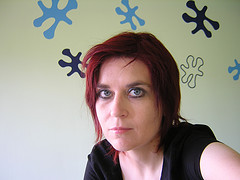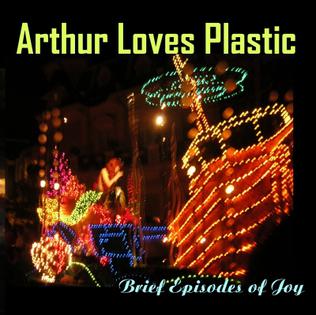
A rave is a dance party at a warehouse, club, or other public or private venue, typically featuring performances by DJs playing electronic dance music. The style is most associated with the early 1990s dance music scene when DJs played at illegal events in musical styles dominated by electronic dance music from a wide range of sub-genres, including drum and bass, dubstep, trap, break, happy hardcore, trance, techno, hardcore, house, and alternative dance. Occasionally live musicians have been known to perform at raves, in addition to other types of performance artists such as go-go dancers and fire dancers. The music is amplified with a large, powerful sound reinforcement system, typically with large subwoofers to produce a deep bass sound. The music is often accompanied by laser light shows, projected coloured images, visual effects and fog machines.
Intelligent dance music (IDM) is a style of electronic music originating in the early 1990s, defined by idiosyncratic experimentation rather than specific genre constraints. It emerged from the culture and sound palette of electronic styles such as ambient techno, acid house, Detroit techno and breakbeat; it has been regarded as better suited to home listening than dancing. Prominent artists associated with it include Aphex Twin, Autechre, Squarepusher, Boards of Canada, Amon Tobin, Higher Intelligence Agency, Telefon Tel Aviv, μ-Ziq, The Black Dog, The Future Sound of London, Mouse on Mars, Biosphere, Orbital and Luke Vibert.
Electronica is both a broad group of electronic-based music styles intended for listening rather than strictly for dancing and a music scene that came to prominence in the early 1990s in the United Kingdom. In the United States, the term is mostly used to refer to electronic music generally.
Tech house is a subgenre of house music that combines stylistic features of techno with house. The term tech house developed as a shorthand record store name for a category of electronic dance music that combined musical aspects of techno, such as "rugged basslines" and "steely beats", with the harmonies and grooves of progressive house. The music originally had a clean and minimal production style that was associated with techno from Detroit and the UK.
Hi-NRG is a genre of uptempo disco or electronic dance music (EDM) that originated during the late 1970s and early 1980s.
Geneva are a Scottish rock band formed in Aberdeen in 1992. The group enjoyed moderate chart success but split after the release of their second album. They reformed in 2018, minus guitarist Stuart Evans, in preparation for a live tour in 2019.

Miguel Steward better known by his stage name Miguel Migs, is an American deep house DJ and producer and the founder of Salted Music, an independent electronic dance music record label based in San Francisco, California.
Electronic dance music (EDM), also referred to as club music, is a broad range of percussive electronic music genres originally made for nightclubs, raves, and festivals. It is generally produced for playback by DJs who create seamless selections of tracks, called a DJ mix, by segueing from one recording to another. EDM producers also perform their music live in a concert or festival setting in what is sometimes called a live PA. Since its inception EDM has expanded to include a wide range of subgenres.
Luke Busby is an English music producer-songwriter, best known for being part of UK electronic pop band Temposhark, with singer/songwriter Robert Diament.

Kate Havnevik is a Norwegian film composer, songwriter and singer. Her debut album, the critically acclaimed electronica-infused Melankton, was released in March 2006 on iTunes and April 2006 in Norway only, before being licensed internationally to Universal Republic USA later. Havnevik has successfully utilized PledgeMusic campaigns to fund some of her albums, including You, released October 2011, and &i, released March 2015. Her music has been prominently featured in TV shows such as Grey's Anatomy, The O.C., and The West Wing.

Arthur Loves Plastic or ALP is the performing name of Washington, D.C. based electronic music recording artist Beverley Joy "Bev" Stanton.

Melankton is the debut album by Norwegian singer, Kate Havnevik, featuring the single "Unlike Me," and the song "Nowhere Warm" as featured on the TV show Grey's Anatomy. The album was released in her home country of Norway on April 10, 2006, before being issued in the UK, accompanied by a bonus track, entitled "Travel In Time," which was written and produced with Carmen Rizzo. Rizzo also helped mix some tracks and master the record.
German electronic music is a broad musical genre encompassing specific styles such as Electroclash, trance, krautrock and schranz. It is widely considered to have emerged in the late 1960s and early 1970s, becoming increasingly popular in subsequent decades. Originally minimalistic style of electronic music developed into psychedelic and prog rock aspects, techno and electronic dance music. Notable artists include Kraftwerk, Can, Tangerine Dream and Deutsch Amerikanische Freundschaft. German electronic music contributed to a global transition of electronic music from underground art to an international phenomenon, with festivals such as Love Parade, Winterworld and MayDay gaining prominence alongside raves and clubs.

Brief Episodes of Joy is the sixteenth album from Arthur Loves Plastic and was released in 2008.
Robert Solheim is an electronic music composer from Norway. His styles are techno and deep/tech-house, downtempo and electronica with a strong emphasis on Nordic sound. Influenced by all kinds of electronic music, he has developed his characteristic style from his first ambient and ambient-techno releases in the 1990s, through down tempo and deep/tech-house and techno for clubs and home entertainment.

Acid house is a subgenre of house music developed around the mid-1980s by DJs from Chicago. The style is defined primarily by the squelching sounds and basslines of the Roland TB-303 electronic bass synthesizer-sequencer, an innovation attributed to Chicago artists Phuture and Sleezy D circa 1986.
Techno is a genre of electronic dance music which is generally produced for use in a continuous DJ set, with tempos being in the range of 120 to 150 beats per minute (BPM). The central rhythm is typically in common time (4/4) and often characterized by a repetitive four on the floor beat. Artists may use electronic instruments such as drum machines, sequencers, and synthesizers, as well as digital audio workstations. Drum machines from the 1980s such as Roland's TR-808 and TR-909 are highly prized, and software emulations of such retro instruments are popular.
Chilean electronic music refers to the electronic music genre and its subgenres produced in Chile or by Chileans.
Belgian hardcore techno is an early style of hardcore techno that emerged from new beat as EBM and techno influences became more prevalent in this genre. This particular style has been described as an "apocalyptic, almost Wagnerian, bombastic techno", due to its use of dramatic orchestral stabs and menacing synth tones that set it apart from earlier forms of electronic dance music. It flourished in Belgium and influenced the sound of early hardcore from Netherlands, Germany, Italy, UK and North America during the early-1990s, as a part of the rave movement during that period.






